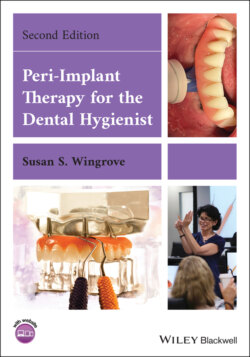Читать книгу Peri-Implant Therapy for the Dental Hygienist - Susan S. Wingrove - Страница 35
Xerostomia
ОглавлениеThe elderly population is increasing, living longer, and over 90% of adults 65 years or older are taking one or more medications that can cause xerostomia (dry mouth). Xerostomia is not limited to the elderly. A high percentage of younger people take antidepressants or other medications that have the side effect of dry mouth. Xerostomia can be caused by medications and is often increased by smoking or drinking alcohol.
Radiation therapy can also cause a reduction in saliva due to damaging the salivary glands from radiation treatments for head and neck cancer. Saliva production is necessary to help bathe the teeth, it prevents decay and makes it easier to talk, swallow, taste, and digest food. The systemic diseases associated with xerostomia are Sjogren’s syndrome (SS), sarcoidosis, and amyloidosis, all of which are inflammatory diseases.
Implant therapy has been shown to have a high implant survival rate for patient with SS with low marginal bone loss or biological complications (44, 45). As hygienists, we can help these patients with good home care recommendations specifically designed for dry mouth. Multiple products are being developed specifically for xerostomia.
Hygienists, we can help dry mouth patients with xerostomia by recommending products that provide much‐needed moisturizing relief. Neutral pH products with xylitol are ideal to prevent higher than the other patients’ risk for decay and periodontal/peri‐implant disease. Oral biofilm for dry mouth patient can lead to a higher gingival inflammation index and implant treatment has shown to be a good treatment choice for this population. Implants have the least amount of host response, as long as they remain healthy. They do not decay and have the highest success rate of any type of restorative procedure we provide in dentistry.
Oral biofilm drives periodontal inflammation starting with gingivitis/mucositis and progressing to periodontitis/implantitis. The 2017 AAP/EFP World Workshop to develop new classifications and conditions stated; “there is definitely evidence that if a patient does not control the plaque/oral biofilm and does not present for regular implant maintenance, poor biofilm control is a risk factor for peri‐implantitis” (19). Once infection is in the oral cavity it is a direct link to the bloodstream and can affect the overall health of your patient. The process can be reversed if caught early, before infection has caused a loss of bone. If it is not caught in a timely manner it can also progress into oral‐systemic diseases that can affect the heart, the lungs, and pregnancy.
